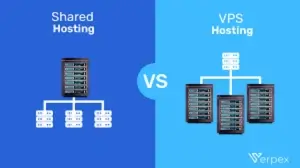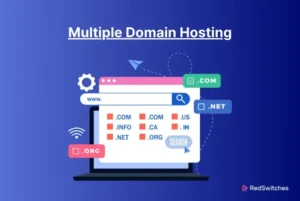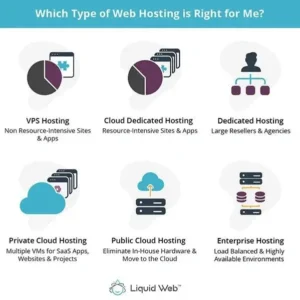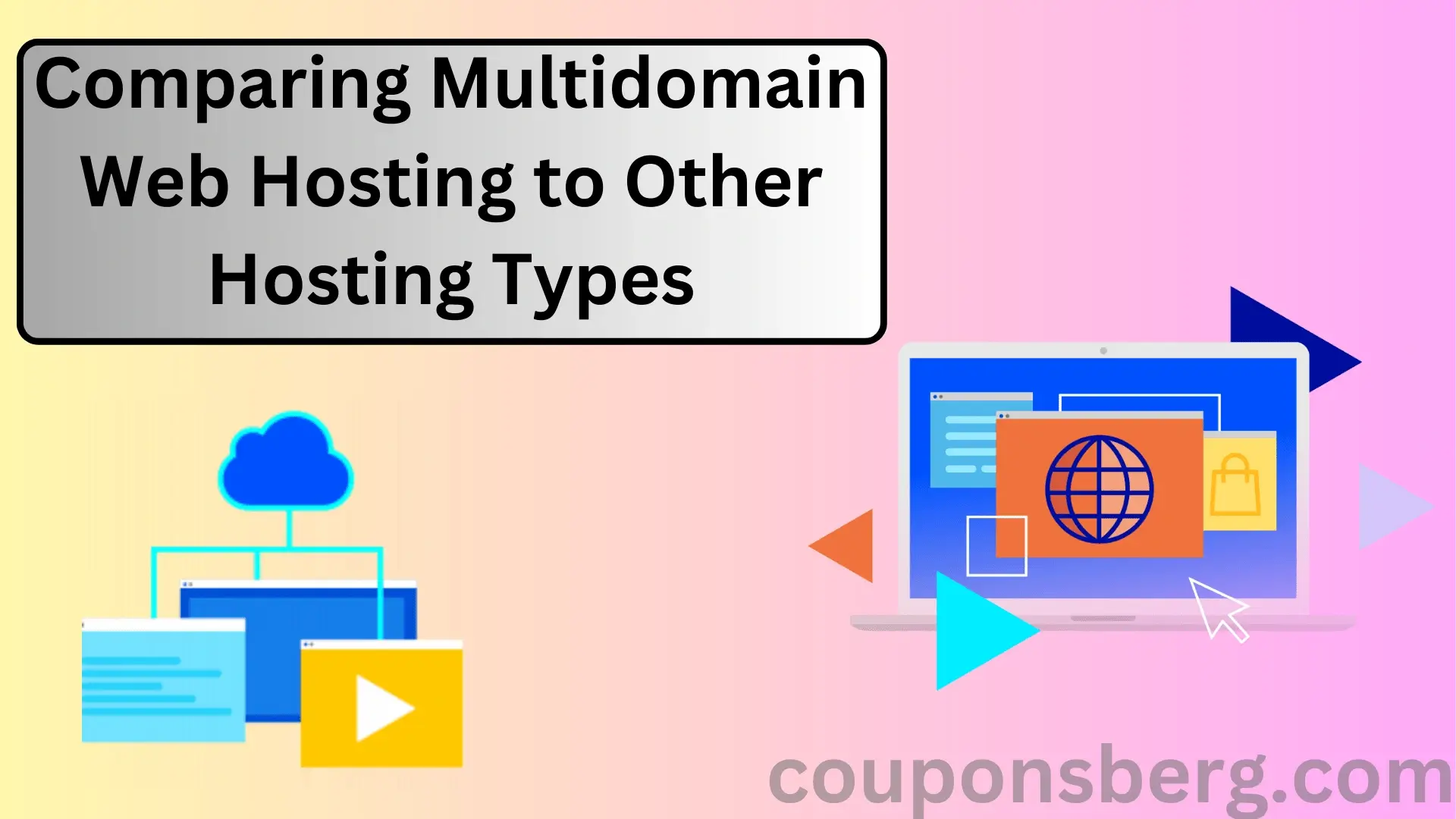Multidomain Web Hosting : Using multidomain web hosting, you may use a single hosting account to manage numerous websites. For people and companies who oversee several websites or domains, it is a well-liked option. Multidomain web hosting gives each domain its own unique resources and control panel, in contrast to shared hosting, which allows numerous users to share the same resources. Since virtualization is not used and all domains share the same server resources, it differs from VPS hosting.
The decision to use multidomain web hosting has several benefits. First of all, it eliminates the need for separate hosting accounts by enabling you to host many websites. This can be convenient and reasonably priced, particularly if you run multiple small blogs or websites. Second, having a single control panel to manage all of your domains makes maintaining several websites easier. Finally, in comparison to shared hosting, multidomain web hosting frequently provides more features and resources.
There are, however, a few drawbacks to take into account. If server resources are not allocated appropriately, resource limits may arise and could impact the functionality of every website you host. Since several websites share the same resources, a high traffic or resource utilisation on one website could potentially affect the performance of the other websites.
When compared to alternative hosting options, shared hosting is the least expensive choice; nevertheless, it does not offer the same freedom and control as multidomain hosting. Compared to multidomain hosting, VPS hosting offers more dedicated resources, yet it could still have certain drawbacks.
Although dedicated hosting is frequently more expensive, it offers the highest level of control and resources. Conversely, cloud hosting provides scalability and stability, but it might not be appropriate for every user.
Think about things like how many websites you oversee, how much control and resources you need, and your budget when selecting the best hosting option for your requirements. Making an informed decision and ensuring that your websites are hosted successfully and efficiently may be achieved by being aware of the distinctions between the various forms of hosting.
Key takeaway:
It is possible to host numerous websites with multidomain web hosting: It’s straightforward and economical to host numerous websites under a single hosting account when you use multidomain web hosting.
Cost-effectiveness: Since you only need to pay for one hosting account to host numerous websites, multidomain web hosting is typically more affordable than other hosting options.
Web hosting with multiple domains is convenient and manageable: You can quickly and simply administer every one of your websites from a single control panel when you use multidomain web hosting, which simplifies the administration procedure.
What is Multidomain Web Hosting?

Managing several websites without having to buy separate hosting plans for each name is made easier with multidomain web hosting, which enables customers to host multiple domains on a single hosting account. What you need know about multidomain web hosting is as follows:
- Efficiency: By removing the need to manage several hosting accounts and conserving time and money, multidomain hosting provides users with multiple websites with an affordable and efficient alternative.
- Centralised administration: Multidomain hosting enables the management of all websites from a single dashboard or control panel, simplifying the process of monitoring and updating numerous websites at once.
- Resource distribution: In multidomain hosting, bandwidth and disc space are distributed among all hosted domains. To guarantee optimal performance for all domains, it is imperative to take into account the resources needed by each website.
- Domain separation: Multidomain hosting makes sure that every domain stays distinct and autonomous even when they share resources. One domain’s modifications or problems won’t impact the others.
- Scalability: Since more domains can be added to the hosting account as needed, multidomain hosting makes scalability simple. Because of its adaptability, it is appropriate for companies or people that want to increase their internet presence.
Factual information: Companies with numerous brands or websites frequently use multidomain web hosting. It offers an affordable way for them to manage every one of their internet properties from one hosting account.
How does Multidomain Web Hosting differ from Shared Hosting?
Shared hosting and multidomain web hosting are not the same in a few important aspects. What distinguishes shared hosting from multidomain web hosting? Below, let’s examine them:
1. Resource allocation: Shared hosting allows several websites to share a server’s resources, including CPU, RAM, and storage. This implies that the performance of other websites on the server may be impacted if one website has an increase in traffic or needs more resources. However, multidomain web hosting provides improved performance and stability by allocating specific resources to each hosted website.
2. Control and customisation: Because shared hosting is overseen by the hosting company, access to server configurations and settings is frequently restricted. Nonetheless, website owners have greater customisation and control options when using multidomain web hosting. With root access to their virtual server, they can install applications, alter settings, and make other adjustments in accordance with their unique needs.
3. Scalability: Compared to shared hosting, multidomain web hosting provides more scalability. Because of server limitations and shared resources, shared hosting may hinder the growth of your website. On the other hand, multidomain web hosting makes it simple to increase your resources as your website grows, guaranteeing maximum performance even during moments of high traffic.
4. Security: Although shared hosting is thought to be safe, a compromised website may have an impact on other websites hosted on the same server due to the shared nature of resources. On the other hand, multidomain web hosting offers improved security protocols, website isolation, and the capacity to incorporate sophisticated security elements. This provides increased defence against any dangers.
5. Cost: Shared hosting is sometimes less expensive, which makes it an economical choice for novices or side projects. Even though multidomain web hosting is usually more expensive, it is appropriate for companies or individuals with numerous websites or larger traffic demands.
Think about your budget, the degree of control and customisation you require, the size and development potential of your websites, and other aspects before deciding between shared hosting and multidomain web hosting. Finding the hosting service that best suits your needs will require you to evaluate your unique requirements.
How does Multidomain Web Hosting differ from VPS Hosting?

There are a few significant distinctions between VPS hosting and Multidomain Web hosting that should be taken into account.
- Resource Allocation: What is the difference between VPS and Multidomain Web Hosting, then? Multiple websites share the same CPU, memory, and storage space when they use multidomain web hosting. But with VPS Hosting, every website has its own set of resources, giving you more control and dependability.
- Isolation: Since Multidomain Web Hosting does not offer total website isolation, problems with performance or security on one site may have an impact on other websites. However, with VPS Hosting, every website is separated within its own virtual server, providing increased security and autonomy.
- Scalability : is an additional distinction between VPS hosting and multidomain web hosting. Scalability is usually restricted by multidomain web hosting because resources are shared by several domains. On the other hand, websites may easily scale with VPS Hosting, increasing their resources quickly and effectively as needed.
- Customizability: Since modifications may have an impact on all shared server websites, Multidomain Web Hosting restricts the amount of customisation that can be done to programme installations and server configurations. VPS Hosting, on the other hand, gives customers greater freedom and flexibility to tailor their server environment to match their needs.
To summarise, the primary distinction between VPS hosting and Multidomain Web hosting is the degree of control, isolation, and scalability. VPS Hosting is appropriate for companies or individuals with higher performance and customisation expectations since it provides greater control and resources allocated to each website.
Similar to this, a real-life account of a small business owner might emphasise the advantages of virtual private server hosting. Let’s examine using Sarah’s experience how Multidomain Web Hosting varies from VPS Hosting. In the beginning, Sarah, an online retailer, used Multidomain Web Hosting in order to cut expenses.
Yet as her company expanded, resource sharing caused her to run into problems with performance and security. Sarah saw increased website speed, dependability, and ease of resource scaling after moving to VPS Hosting. Better client happiness, higher sales, and eventually the success of her internet business were the outcomes of this.
Advantages of Multidomain Web Hosting

You may have the best of both worlds with multidomain web hosting: the affordability and simplicity of hosting numerous websites at the same time. A simpler approach to managing your websites means bidding farewell to the headache of overseeing several hosting accounts. Discover the benefits of multidomain web hosting as we explore its features, which include cost-effectiveness, the capacity to host several websites, convenience, and simplicity of administration.
Ability to host multiple websites
One of the key benefits of multidomain web hosting is the capacity to host many websites. For people and companies who have various online operations, this kind of hosting makes it convenient and affordable to host multiple websites with a single hosting account. The following are some crucial things to think about while deciding whether to host several websites:
- Savings: Having a single hosting account instead of individual ones allows you to host more websites and save money on hosting. Those on a tight budget or small enterprises can especially benefit from this.
- Convenience: Multidomain web hosting makes it much simpler to manage many websites. All of your websites are accessible and manageable from a single dashboard or control panel. This makes managing websites easier and does away with the need to enter into several hosting accounts.
- Resource distribution: With multidomain web hosting, you may distribute resources among your several domains, including databases, bandwidth, and storage space. This makes it possible for you to effectively manage your resources and guarantee that every website has what it needs to function at its best.
- Scalability : is another benefit of multidomain web hosting. You don’t have to switch to a more expensive hosting plan as your online business expands because you can easily add new websites to your hosting account.
- Distinct identities for each website: With a multidomain web hosting service, every website can have its own distinct domain name, email addresses, and content. You can keep distinct identities and branding for every website as a result.
Multidomain web hosting is a good choice for people and companies wishing to handle various online projects effectively, cut expenses, and streamline website maintenance because it allows you to host multiple websites.
Cost-efficiency

- One of the main benefits of multidomain web hosting is its cost-effectiveness.
- You can host numerous websites under a single hosting plan with multidomain web hosting, which helps to cut costs.
- You can save money by hosting all of your websites under a single hosting account, rather than buying individual hosting plans for each website.
- This is especially helpful for people or companies who already have a lot of websites or who intend to start more in the future.
- You can reduce your hosting costs significantly by selecting multidomain web hosting.
- Often, multidomain web hosting has affordable pricing tiers that let you get the most for your money.
Pro-tip: You should weigh other aspects like the provider’s reputation, customer service, uptime guarantees, and extra features before selecting a multidomain web hosting service only because it’s more affordable. Saving money is crucial, but you also want to be sure the hosting company can fulfil your needs and offer dependable, effective hosting for all of your websites.
Convenience and ease of management
The primary benefits of multidomain web hosting are convenience and simplicity of administration, which makes it a sensible option for people and companies with numerous internet ventures. With this kind of hosting, customers may effectively administer several websites from a single control panel.
Without having to buy different hosting plans for each domain, customers can quickly create, remove, and edit websites with multidomain web hosting. Having to keep track of numerous login credentials and manage multiple hosting accounts is eliminated. Users can save time and streamline their website maintenance process by utilising a single account.
Moreover, centralised control and monitoring tools are provided by multidomain web hosting. The maintenance process is made easier for users by giving them simple access to all the files, databases, and settings for their websites from a single interface. It is simpler to do duties like email account management, software updates, and website performance monitoring thanks to this centralised control.
Managing domains and subdomains is also made easier with multidomain web hosting. Within their hosting account, users may easily register, maintain, and even build subdomains for special needs. Because of its flexibility, websites may be more easily categorised and organised, which facilitates managing various projects and navigation.
In conclusion, multidomain web hosting provides the comfort and simplicity of use needed for effectively administering numerous websites. For users who want to make managing their websites easier, this hosting type is a sensible option because of its centralised control, streamlined procedures, and useful feature
Disadvantages of Multidomain Web Hosting

Getting involved in multidomain web hosting has its own set of disadvantages. We’ll examine the drawbacks of this kind of hosting, including resource constraints and possible performance effects. So grab on tight as we examine the many obstacles you may encounter while utilising multidomain web hosting.
Resource limitations
It’s crucial to keep in mind the potential effects resource constraints related to multidomain web hosting may have on the functioning and performance of your websites. A table summarising the main resource constraints is provided below.
Restriction of Resources
1. Disc Space: Most multidomain web hosting packages allot a specific quantity of disc space to every website they serve. This implies that in order to avoid going over the allotted amount, you must carefully control how much disc space you use.
2. Bandwidth: The quantity of data that can be sent back and forth between your website and its users is referred to as bandwidth. Plans for web hosting many domains frequently feature a shared bandwidth pool that is used by all of the hosted websites. This implies that the performance of other websites on the same hosting plan may be impacted if one website receives a lot of traffic.
3. CPU and Memory: Limited CPU and memory resources are shared by all hosted websites in shared hosting settings. The performance of other websites on the same plan may be impacted if one website has a spike in traffic or uses a large amount of CPU and memory resources.
4. Database Connections: The quantity of simultaneous database connections that are permitted may be restricted by multidomain web hosting plans. Websites with high traffic levels or those that mostly rely on database queries may suffer as a result.
5. Email Limitations: The quantity of email accounts and email storage space that can be used with certain multidomain web hosting plans is limited. You should take these resource constraints into account if you need a lot of email accounts or a lot of storage space for your emails.
6. Add-On Domains: The number of add-on domains that are permitted is frequently limited in multidomain web hosting plans. Make sure the hosting package can support the quantity of domains you need if you intend to host several websites.
It’s crucial to give these resource constraints serious thought when selecting a multidomain web hosting package. Examine the requirements of your website and make sure the hosting package you choose has the resources to support your websites efficiently.
Potential performance impacts
The following elements must be taken into consideration when talking about the possible performance effects of multidomain web hosting:
Increased server burden: Since each website needs a different set of resources to operate properly, hosting numerous websites on one server may result in a higher server load. As a result, all of the websites housed on the server may experience a performance delay as a result.
Restricted resources: There could be restrictions on the amount of CPU, memory, and disc space that multidomain web hosting offers. The performance of other websites hosted on the same server may suffer if these resources are not distributed properly, particularly if one website ends up using a disproportionate quantity of them.
Traffic spikes: A single website may use up a large amount of the server’s resources during an unexpected increase in traffic, which could negatively impact the functionality of other websites housed on the server. To guarantee that every website performs at its best, it is essential to constantly watch over and control the flow of visitors.
Security flaws: Having several websites hosted on one server raises the possibility of security flaws. The security and functionality of the other websites on one server may be affected if only one website is compromised.
It is highly advised to take the following actions to lessen these possible performance impacts:
- Make sure that every website has enough resources available to it by keeping a regular eye on the server’s resources and allocating them correctly.
- Improve the speed of your website by using caching techniques, reducing the amount of resource-hungry plugins or scripts, and improving the code.
- Put strong security measures into place by using powerful security plugins, creating secure passwords, and upgrading all websites on a regular basis. By taking these steps, the possibility that any website could become compromised in some way is reduced.
Multidomain web hosting can be used to minimise associated risks and assure optimal performance by carefully weighing these potential affects on performance and putting the required procedures in place.
Comparison to Other Hosting Types

There are several choices for web hosting, each with special features and advantages of its own. We’ll examine how multidomain web hosting compares to other forms of hosting in this section. We’ll examine dedicated hosting, cloud, VPS, and shared hosting in more detail. Prepare to discover the unique benefits and factors related to each kind, which will assist you in making an informed choice regarding the hosting requirements for your website. Now let’s get started!
Shared Hosting
A common form of web hosting utilised by many people and small organisations is shared hosting. It has many benefits and drawbacks that need to be taken into account when selecting a hosting service.
Since the cost is divided among several users on the same server, shared hosting is usually the most economical choice.
- Simpleness of use: Most shared hosting companies come with easy-to-use control panels that make it simple to maintain your website.
- Resource sharing: Several websites share server resources including CPU, RAM, and bandwidth while using shared hosting. This implies that the performance of other websites hosted on the same server may be impacted if one of the websites receives an unexpected spike in traffic.
- Limited customisation: The amount of customisation is frequently restricted by the software and apps that can be installed on shared hosting plans.
- Security issues: There is a greater chance of security flaws because numerous websites share the same server. Reputable shared hosting companies take precautions to guarantee server security.
- Technical assistance: Most shared hosting companies give consumers with technical support to help them with any problems they could run into.
It’s critical to evaluate the demands and traffic requirements of your website before deciding on shared hosting. Small to medium-sized websites with moderate traffic levels can benefit from shared hosting.
You may need to think about additional hosting options, including VPS hosting or dedicated hosting, if you anticipate huge traffic levels or need more control and customisation possibilities. The hosting solution you choose will ultimately depend on your budget and unique requirements.
VPS Hosting
is a well-liked hosting option that has a number of benefits over other forms of hosting. Here are some important things to think about before selecting
- Improved performance: VPS hosting gives your website dedicated resources like CPU, RAM, and storage, guaranteeing peak performance. Applications that require a lot of resources or websites with a lot of traffic can benefit from this.
- More personalisation and control: VPS hosting gives you root access to your virtual server, giving you the ability to install programmes of your choosing, change configurations, and take total command over your hosting environment. For developers and enterprises with specialised needs, this level of control is perfect.
- Scalability: VPS Hosting makes it simple to scale, so you can quickly increase or decrease your resources in accordance with the demands of your website. It is cost-effective because of its flexibility, which guarantees that you only pay for the resources you really need.
- Enhanced security: When compared to shared hosting, VPS hosting provides a better level of security. Every virtual server is separated from the others, therefore your server will not be impacted by security flaws on other websites. It is up to you to put your own security measures in place.
- Reliability: Because your website is not impacted by other users’ activity on the server, VPS hosting offers a more stable and dependable hosting environment. This guarantees steady performance and removes the possibility of server overload.
Websites that need more power, resources, and dependability than shared hosting can provide should consider VPS hosting. When choosing VPS Hosting, you may make an informed choice if you take these aspects into account.
Let’s now examine a real-world historical example of how VPS hosting aided in the expansion of companies. With the growth of e-commerce in the early 2000s, businesses required a scalable and dependable hosting solution to manage an increase in online transactions.
With virtual private server (VPS) hosting, companies may now enjoy improved speed and dedicated resources without having to pay for a dedicated server, which was previously unthinkable.
VPS Hosting was adopted by a large number of small and medium-sized enterprises, giving them the capacity to manage their expanding clientele. Thanks to this technology, businesses were able to grow operations with ease and maintain website performance even during periods of high traffic. Together with enhanced security and personalisation choices, this scalability assisted companies in building a solid online presence and successfully meeting the demands of their clientele.
VPS Hosting became a vital tool for companies as e-commerce grew, allowing them to provide flawless online experiences and increase their profitability. VPS Hosting’s track record of success demonstrates its enduring influence on the expansion and advancement of companies in the digital era.
Dedicated Hosting
When weighing your web hosting alternatives, dedicated hosting stands out from other hosting options due to the following advantages:
- Total command: You have total control over your server when you choose dedicated hosting. This implies that you can install whatever software or programmes you need, adjust it to maximise performance, and customise it to meet your unique needs.
- Increased security: When it comes to security, dedicated hosting outperforms shared hosting. There is no chance that your data or resources will be compromised by other websites hosted on the same server because you are the only user.
- Resources that are guaranteed: If you choose dedicated hosting, you will have access to all of the server’s resources. By doing this, you can guarantee steady performance and avoid any possible lags or problems that can arise from sharing resources with other users.
- Scalability: Scalability is made simple with dedicated hosting. You may quickly upgrade your server to handle more traffic and data as your website expands and needs more resources.
- Increased website speed: Dedicated hosting can greatly improve your website’s speed and overall performance because you aren’t sharing resources with other users. This is particularly crucial for websites that need quick loading times or receive a lot of traffic.
- Dependability: A high degree of dependability is provided by dedicated hosting. Count on dependable performance and sustained uptime because there are dedicated resources and no shared resources.
- Options for customisation: With dedicated hosting, you have the freedom to tailor your server to meet your unique requirements. Complete customisation is possible with dedicated hosting, whether it is for advanced configurations, setting optimisation, or installing certain software.
Dedicated hosting is the best option if you need utmost control, security, and speed for your website.
Cloud Hosting
A growing number of website owners are adopting cloud computing, often known as cloud hosting, due to its many advantages. One of the key benefits of cloud hosting is scalability. With this type of hosting, your website can easily handle fluctuations in traffic because it splits resources over multiple servers. This makes it possible to scale up or down automatically based on demand.
Another advantage of cloud hosting is its dependability. Your website will quickly move to a new server in the event of a server failure because it is housed on a network of servers, minimising downtime.
Flexibility is another benefit of cloud hosting, which makes it simple to increase your resources as your website expands. No physical hardware modifications are needed in order to increase bandwidth, computing power, or storage capacity.
Pay-as-you-go is how cloud hosting works in terms of cost-effectiveness. This keeps you from overpaying for capacity that is not utilised by allowing you to only pay for the resources you actually utilise. It is a very affordable choice for website proprietors.
When it comes to cloud hosting, security is paramount. Strong security measures have been put in place by providers to safeguard your data and website. These safeguards, which guarantee the security of your data, include firewalls, strong encryption, and frequent backups.
Cloud hosting is a dependable and scalable option for website owners when all these advantages are taken into account. It guarantees excellent uptime and cost-effectiveness while providing the flexibility to adapt to your website’s evolving needs.
Choosing the Right Hosting Solution for Your Needs

There are a few things to take into account while selecting the best hosting service for your requirements:
- To select the best hosting option, evaluate the storage, bandwidth, and functionality requirements of your website.
- Choose hosting that allows you to easily scale your resources if you think your website may grow in the future.
- Choose a hosting company that can help you with any problems or questions you may have by providing fast, dependable technical assistance.
- Verify the uptime guarantee offered by the hosting company to be sure your website will always be available.
- To safeguard the information on your website, take into account the security measures put in place by the hosting company.
Pro-tip: To gain insight into other users’ experiences with the hosting company, read reviews and testimonials prior to making your final decision. This might offer important details on the performance, dependability, and general level of client happiness of the supplier.
GET MORE INFORMATION VISIT ON…………..Couponsberg.com
FAQs : Multidomain Web Hosting
1. What is multidomain web hosting?
Answer: Multidomain web hosting is a service that allows you to host multiple domain names under a single hosting account. This means you can manage multiple websites from a single control panel, which can be more cost-effective and convenient compared to having separate hosting accounts for each domain.
2. How does multidomain web hosting differ from traditional web hosting?
Answer: Traditional web hosting typically allows you to host only one domain per account. In contrast, multidomain web hosting lets you host several domains and websites under one account. This is beneficial for businesses or individuals who own multiple websites and want to streamline their hosting management and reduce costs.
3. What are the benefits of using multidomain web hosting?
Answer: The main benefits of multidomain web hosting include:
- Cost efficiency: You save money by not having to purchase separate hosting plans for each domain.
- Simplified management: Manage all your domains and websites from a single control panel.
- Resource sharing: Utilize shared resources (like storage and bandwidth) across multiple domains, which can be more efficient.
- Scalability: Easily add new domains and websites as your business or projects grow.
4. Are there any limitations to multidomain web hosting?
Answer: While multidomain web hosting offers many advantages, there are some limitations to consider:
- Resource allocation: All domains share the same resources (CPU, RAM, bandwidth), which might lead to performance issues if one website consumes too many resources.
- Security risks: A security breach in one domain can potentially affect all other domains hosted on the same account.
- Complexity: Managing multiple websites can become complex and might require more advanced knowledge in web hosting and management.
5. How can I manage multiple domains under one hosting account?
Answer: Most hosting providers offer a control panel (such as cPanel or Plesk) that simplifies the management of multiple domains. Within the control panel, you can:
- Add and remove domains.
- Create separate directories for each website.
- Manage email accounts, databases, and other resources for each domain individually.
- Monitor resource usage and allocate resources as needed.
6. Is multidomain web hosting suitable for everyone?
Answer: Multidomain web hosting is ideal for:
- Businesses with multiple websites.
- Web developers and designers managing several client sites.
- Individuals or bloggers who own multiple domains. However, if you have a single website or expect high traffic on each site, a dedicated hosting plan for each domain might be more suitable. It’s essential to assess your specific needs and choose the hosting solution that best fits them.
